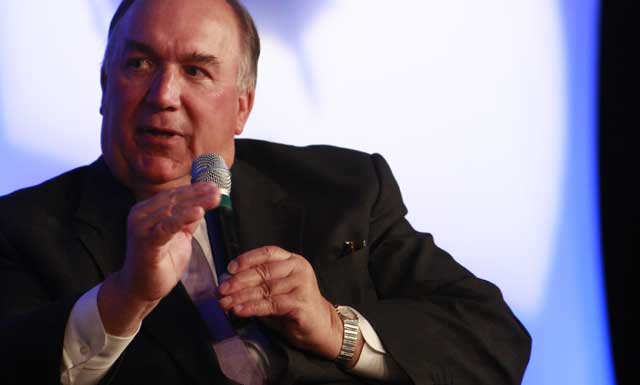
- John Engler is something of a template for Scott Walker right now. The former Michigan governor, who once turned incredibly negative polls into one of the lowest unemployment rates the state has ever had, took on social welfare and, after voters eventually forgave him, was rewarded with three full terms as governor. (We lived in Michigan as kids, and Engler was extremely popular back in the day.) Spencer Abraham, who was one of Michigan’s senators during most of Engler’s time in office, wrote a pretty strong defense of Walker in The Weekly Standard, saying that if he sticks to his guns, he’ll win, just like Engler did. Or will he? A little research into what made Engler tick:
- What happened? Forced to deal with a $1.8 billion deficit when he entered office in 1991, he began by taking a knife to social programs – specifically general assistance programs and programs that employed civil servants. The results were initially extremely unpopular – a symbolic “Englertown” went up in front of the state capital. Engler’s poll numbers initially tanked.
- What happened next Engler’s work was eventually vindicated, and after a recovery in the state’s auto industry and many cuts, the state suddenly had a $300 million surplus. The results were so good that his name came up in vice-presidential conversations multiple times. He never got the chance, but he did leave office in 2003 as a widely-respected figure – although with a pretty big deficit.
- His career since After Engler left office, his successor, Jennifer Granholm, had the same kind of budget hole that faced Engler twelve years before. Engler, meanwhile, is now a lobbyist – he spent six years leading the National Association for Manufacturers and now works for the Business Roundtable. People are name-dropping him for a 2012 Senate run. He’s not interested.
- » Is Engler’s a model to follow? Depends on who you ask. A lot of GOPers have been dropping his name in recent conversations about Scott Walker’s crisis, and a former Engler staffer, John Truscott, makes a pretty apt point. “Polls don’t balance budgets,” he says, noting that it took about three years for Engler’s social changes to recharge the economy. Ultimately, though, Engler and Walker fought for different things – and the difference between cutting off unions at the knees and trimming social programs for the poor is a significant one. See, one big difference: Unions still have money and collective pull, and they’re able to use it. And Engler had backup solutions that benefited nearly everyone. How will Walker help out public employees and the people at large?
Posted by Ernie Smith •
Permalink
